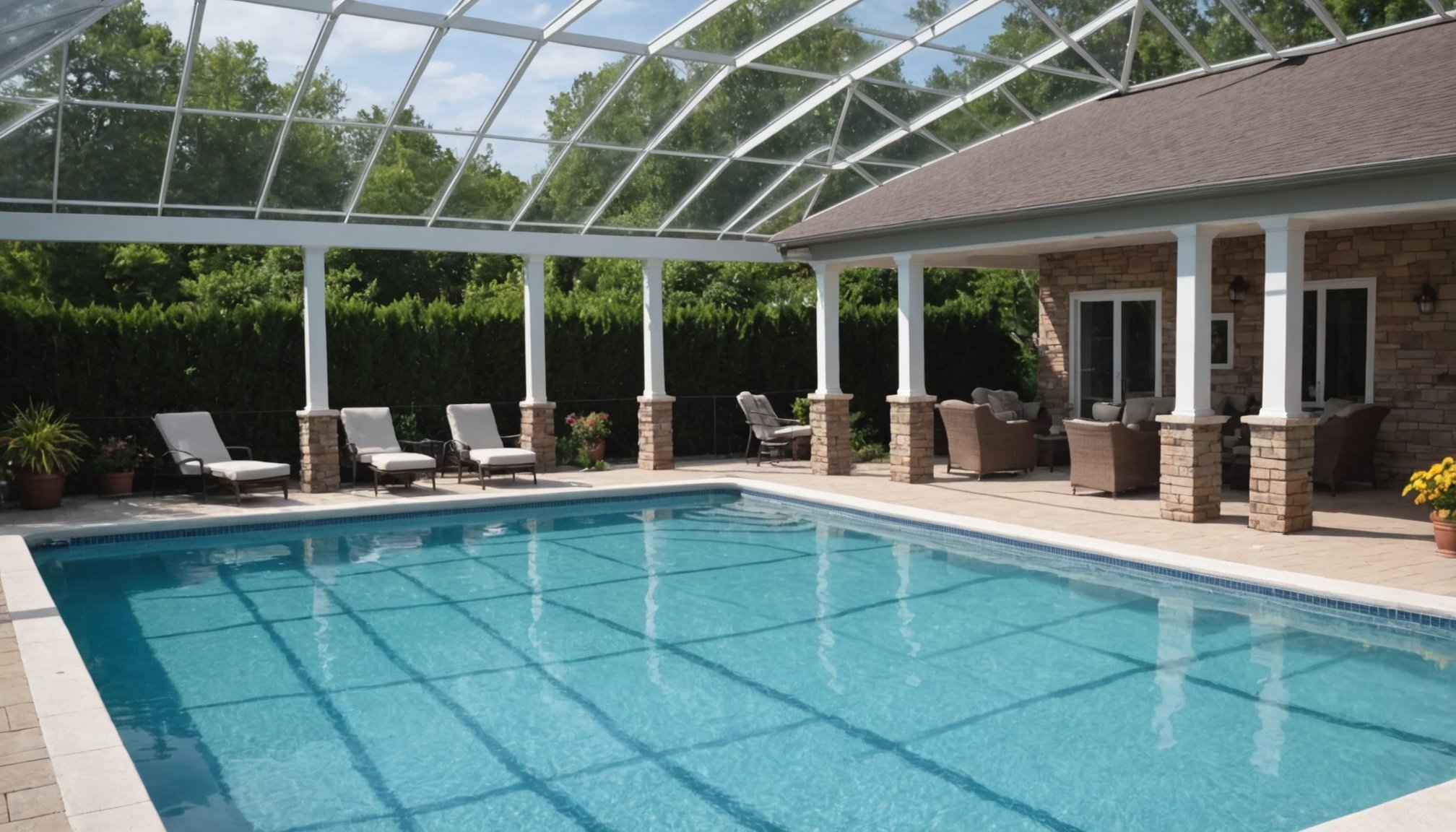Understanding Hard Water and Its Impact on Swimming Pool Equipment
Hard water, common in many UK swimming pools, contains high mineral concentrations, primarily calcium and magnesium. These minerals accumulate in water due to geological and environmental factors, leading to what is known as ‘hardness’. When water with a high mineral content flows through pool systems, it can deposit on walls, pathways, and especially on swimming pool equipment.
The effects of hard water on pool equipment are significant and distinct. As the water circulates, minerals can precipitate out, forming scale on heating elements, filtration systems, and pipes. This scale build-up can reduce efficiency by clogging pipes and fixtures, potentially causing mechanical failures. The reduced efficiency can lead to increased energy consumption as pumps and heaters work harder to maintain optimal conditions.
Sujet a lire : Essential Steps for Safeguarding Your UK Home Swimming Pool During Extended Closures
In the UK, hard water challenges are particularly prevalent due to the country’s varied geological landscape. Areas with more limestone and chalk tend to experience greater hard water issues. Pool owners often find themselves managing more frequent maintenance and cleaning routines, leading to higher costs of operation.
To mitigate these problems, specific softening treatments or routine professional maintenance are recommended, focusing on keeping swimming pool equipment free from obstructive scale. These measures can safeguard the longevity and efficiency of pool systems.
Sujet a lire : Top Pool Accessories That Thrive in the UK”s Ever-Changing Weather
Prevention Strategies to Combat Hard Water Damage
Dealing with hard water can be frustrating, especially when it affects your swimming pool. Implementing effective hard water prevention strategies is key. First, consider using water testing kits as a staple in your swimming pool maintenance. These kits help in monitoring mineral levels, detecting excess calcium or magnesium that contribute to hard water. Regular testing allows you to act before issues arise.
A crucial aspect of combating hard water is regular maintenance and adopting preventive measures. This includes routine cleaning of filters and using specific products designed to avert mineral buildup. You’re not just protecting the pool but also ensuring the longevity of its equipment. Regular checks can prevent the cost and hassle of extensive repairs.
It’s also prudent to explore water treatment solutions like water softeners and filtration systems. Water softeners work by exchanging calcium and magnesium ions for sodium ions, thus reducing hardness. Filtration systems, on the other hand, are excellent for removing excess minerals and improving water quality. Investing in these systems might seem substantial initially, but they offer long-term benefits by safeguarding against scale deposits and other associated issues. Employing these strategies can make managing your swimming pool much simpler and more effective.
Chemical Treatments for Hard Water Management
Effectively handling hard water in pools requires a strategic approach, combining suitable chemical treatments and careful water balancing. Addressing hard water challenges, such as scaling and cloudy water, often involves specific pool chemicals designed to soften and enhance overall water quality.
Types of Chemicals for Hard Water Treatment
For treating hard water, several pool chemicals are commonly used. Calcium sequestrants help to prevent scale by binding excess calcium, while muriatic acid can lower water pH and reduce hardness. Sodium bicarbonate may also be utilized to adjust alkalinity, assisting in the balancing process without altering the pH significantly.
Dosage and Application Guidelines
When applying these chemicals, it’s essential to adhere to precise dosing. Overuse or incorrect application can be detrimental to both equipment and water quality. Manufacturers generally provide specific dosage instructions based on pool volume and hardness levels, helping to achieve optimal results.
Safety Precautions When Using Chemicals
Safety is paramount. Always follow instructions for each pool chemical closely to prevent harm. Protective gear, such as gloves and eyewear, is highly recommended, and ensure the area is well-ventilated during application. Regular monitoring and adjustments help maintain balanced and safe water conditions.
Equipment Cleaning Techniques
Maintaining your pool involves meticulous attention to cleaning techniques and equipment maintenance. The following step-by-step guide will help in tackling hard water deposits that can accumulate over time.
-
Identify the Equipment: Begin by identifying parts of your pool equipment that require cleaning. Focusing on filters, pumps, and chlorinators may be essential.
-
Use Proper Cleaning Agents: Employ suitable household or commercial cleaning products. Products like vinegar or baking soda are effective against mild mineral deposits. For tougher buildup, you might consider a commercial descaler formulated for pool maintenance.
-
Disassemble and Soak: Disassemble removable parts of your equipment. Soak these parts in a cleaning solution for a specified time, typically 15–30 minutes, to dissolve deposits efficiently.
-
Scrub Gently: Using a non-abrasive brush, scrub off loosened deposits. Exercise caution to avoid damaging equipment surfaces.
-
Rinse Thoroughly: After scrubbing, ensure all parts are rinsed thoroughly with water. Leaving residues can lead to further buildup.
-
Reassemble and Test: Once cleaned, reassemble equipment and test for optimal operation.
Regular cleaning schedules are crucial to prevent the accumulation of hard water deposits. Establishing a monthly routine can mitigate the risk of severe buildup, ensuring equipment longevity and efficiency.
Maintenance Schedules to Protect Equipment Longevity
Consistent adherence to maintenance schedules is critical for ensuring the longevity of equipment in any pool care routine. Performing regular checks can prevent unexpected failures and costly repairs. It is advisable to conduct maintenance checks every two months. This frequency caters to the efficient functioning of filters, pumps, and heaters. Monitoring performance through periodic equipment inspections helps in spotting potential issues early.
Chemical treatments, pivotal to pool care, should be ideally administered weekly. This timing helps maintain water balance, preventing damage due to bacteria or chemical build-up which could adversely affect pool components. Regular checks maintain chemical levels, safeguarding both water quality and equipment.
In the UK, seasonal considerations must be taken into account. Winterizing your pool involves draining water from equipment and adding antifreeze, preventing freezing damage. Similarly, spring is ideal for a deep clean and thorough inspection before heightened summer usage. Each season brings specific challenges, as the UK climate influences the type and frequency of maintenance required for optimal operation. Maintaining a comprehensive schedule tailored to these needs not only ensures equipment longevity but enhances overall pool enjoyment.
Professional Services for Hard Water Challenges
Navigating hard water challenges in your pool can be daunting. The good news is, professional help is available to ease the burden. Pool maintenance services offer specialized expertise in identifying and resolving hard water-related issues. These professionals utilize advanced tools and industry-grade solutions that surpass typical DIY efforts.
When looking for a reliable pool maintenance service, consider their experience with hard water solutions. You should also evaluate their customer reviews and responsiveness to inquiries. Another crucial consideration is the scope of services they provide. Do they offer just chemical treatments, or do they include comprehensive cleaning and maintenance?
Choosing professional intervention often provides superior outcomes compared to DIY approaches. Experts not only address immediate problems but also implement preventive measures to safeguard your pool’s longevity. This decreases the likelihood of recurring issues, saving you time and money.
Here are some benefits of opting for professional assistance:
- Expert Analysis: In-depth assessment of your pool’s unique needs.
- Tailored Solutions: Customized treatments effectively targeting hard water challenges.
- Time Efficiency: Quick and productive interventions by knowledgeable technicians.
In short, professional services present a practical and effective solution for managing hard water in pools, ensuring both efficiency and peace of mind.
Product Recommendations for Hard Water Management
Managing hard water in pools can be challenging, but several top-rated products have shown effectiveness. Highlighting these options can aid users seeking the right solutions. Among the highly rated are products featuring both effective chemicals and user-friendly applications.
Top-Rated Products
-
Scale Inhibitors: These products are paramount; they work by preventing calcium deposits, making them a staple in hard water solutions. Users commonly praise their efficiency in maintaining clear pools without excessive scrubbing.
-
Sequestering Agents: Recognised for their ability to bind minerals, these agents rank well in product reviews. They consistently receive positive effectiveness ratings due to their ability to stabilise metal ions, keeping pool surfaces free from stains.
-
Water Softeners: A popular choice, these devices reduce mineral content before water enters the pool. They are often lauded in user reviews for lowering maintenance needs and sustaining water clarity.
Purchasing Tips in the UK
For those in the UK, these hard water solutions are available at most pool supply stores and online. Some high-street retailers offer loyalty discounts, which can make these products more affordable. Always check user product reviews to ensure the chosen solution aligns with your pool’s needs.












